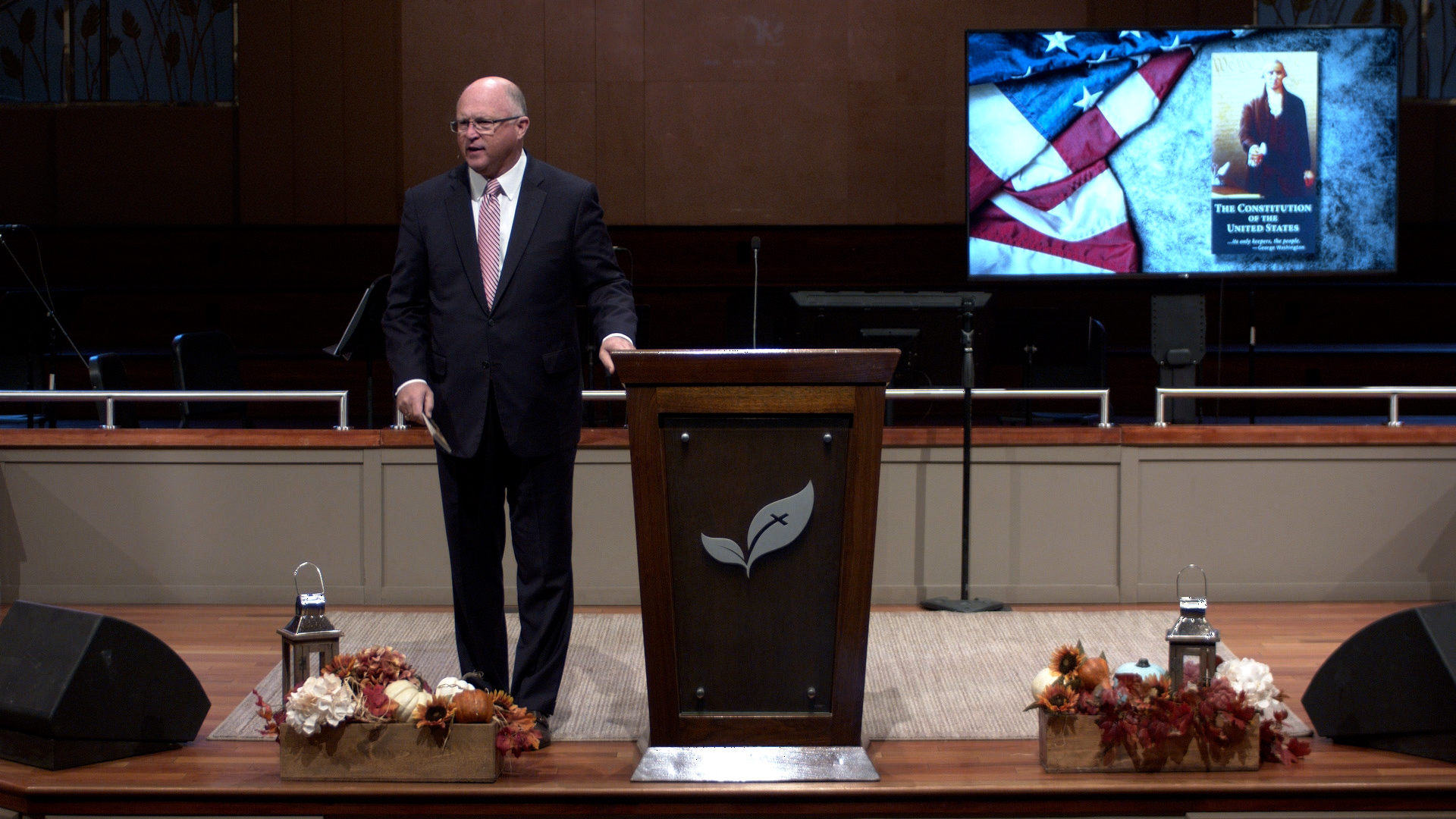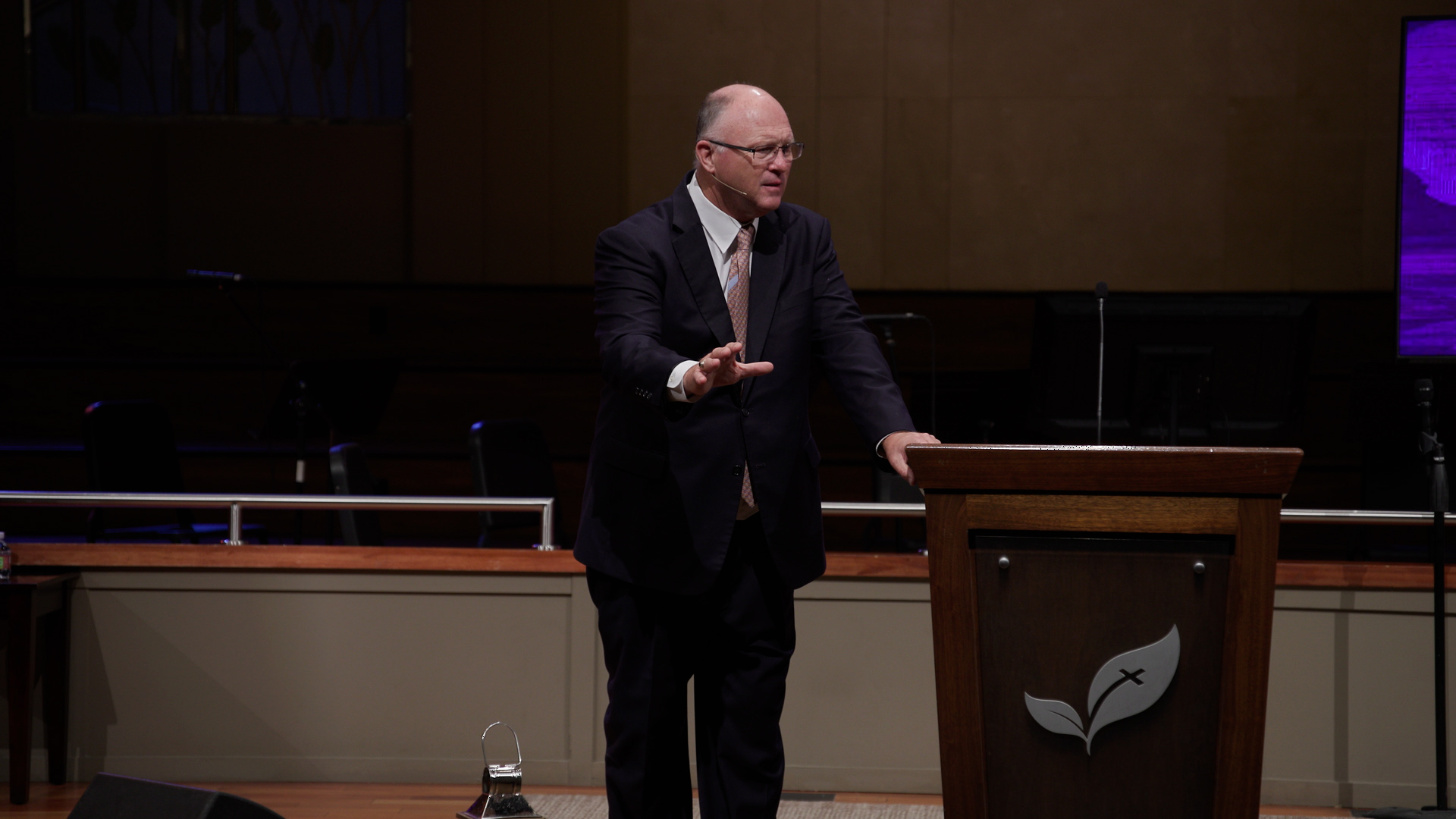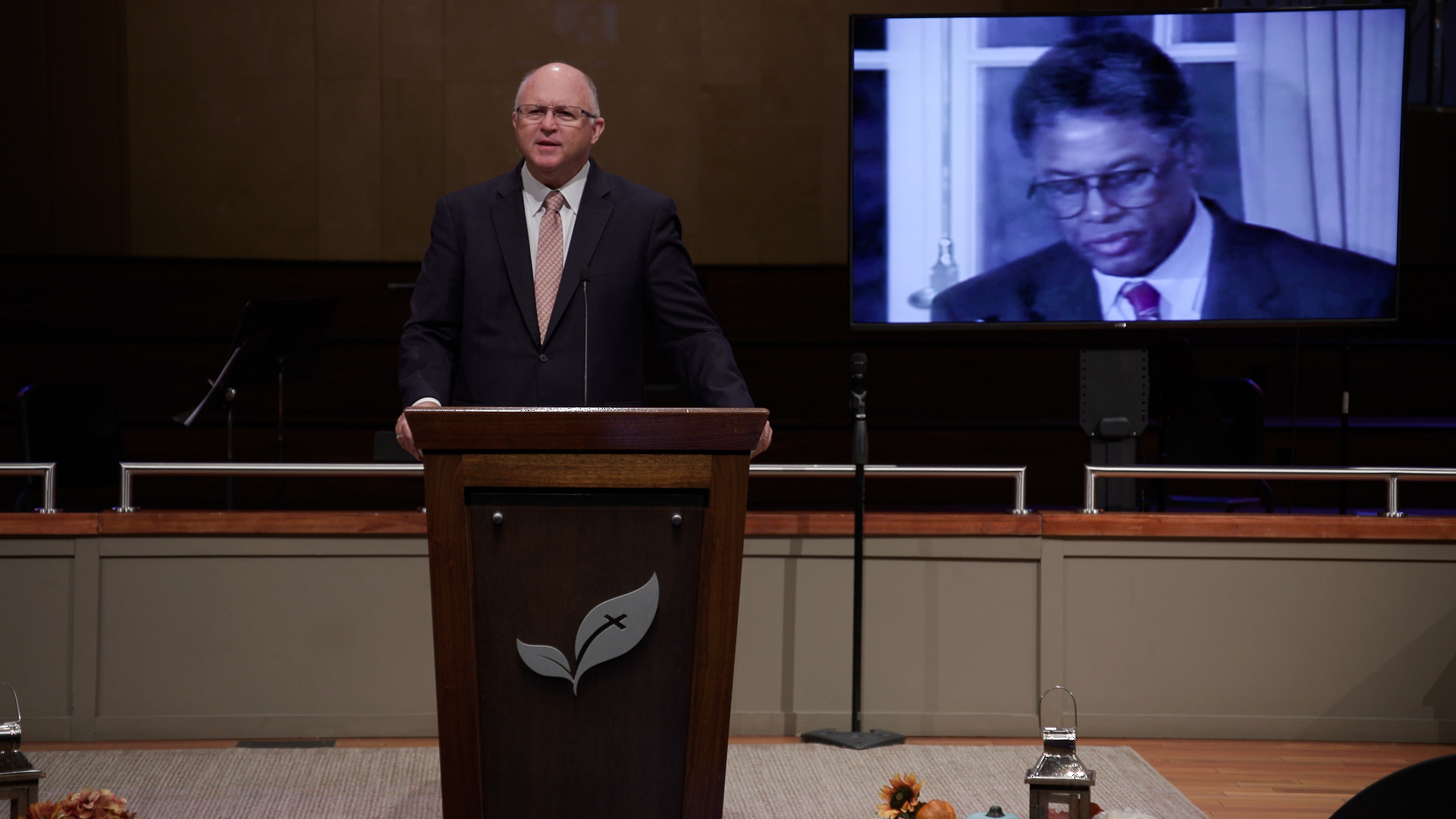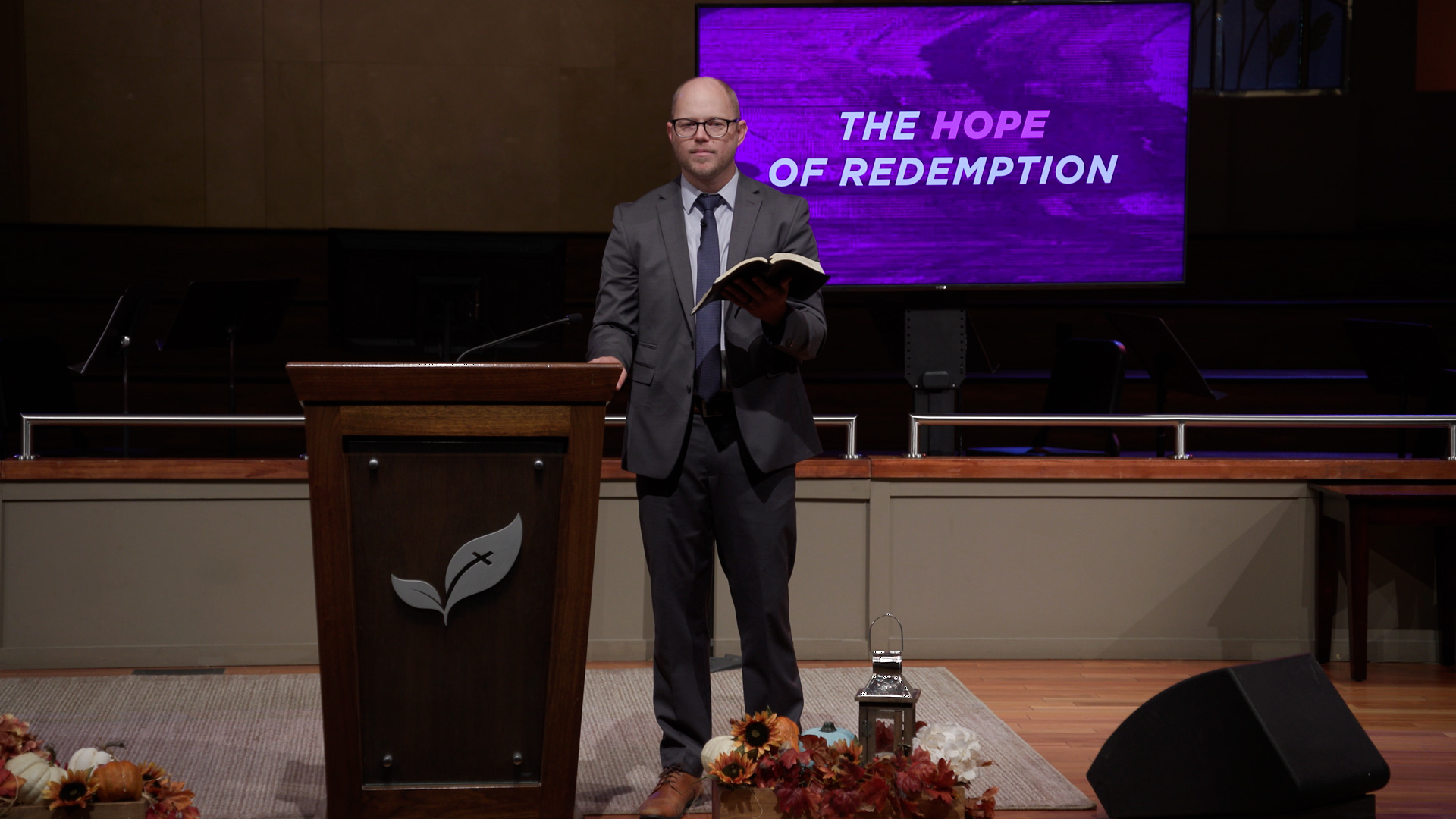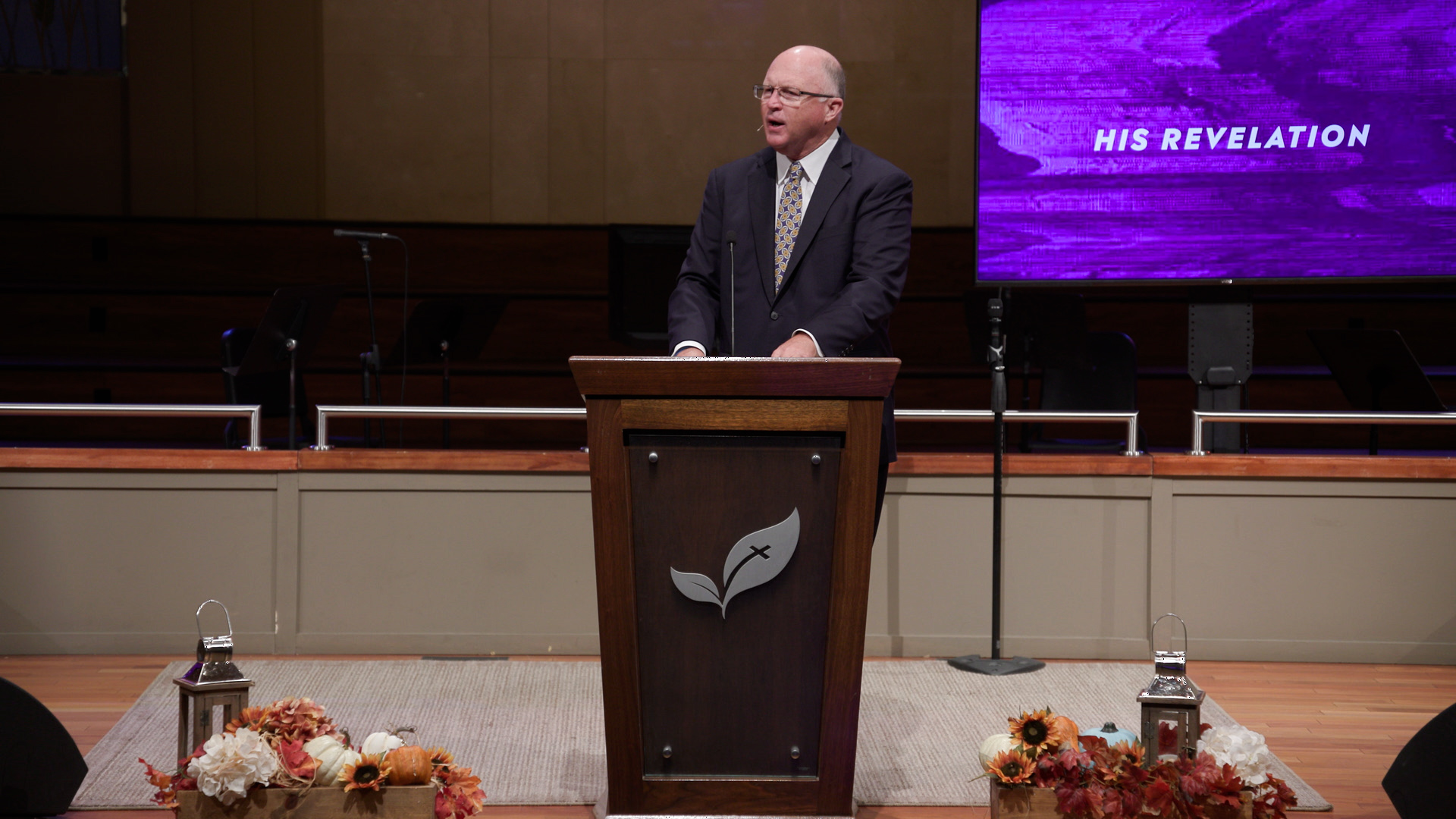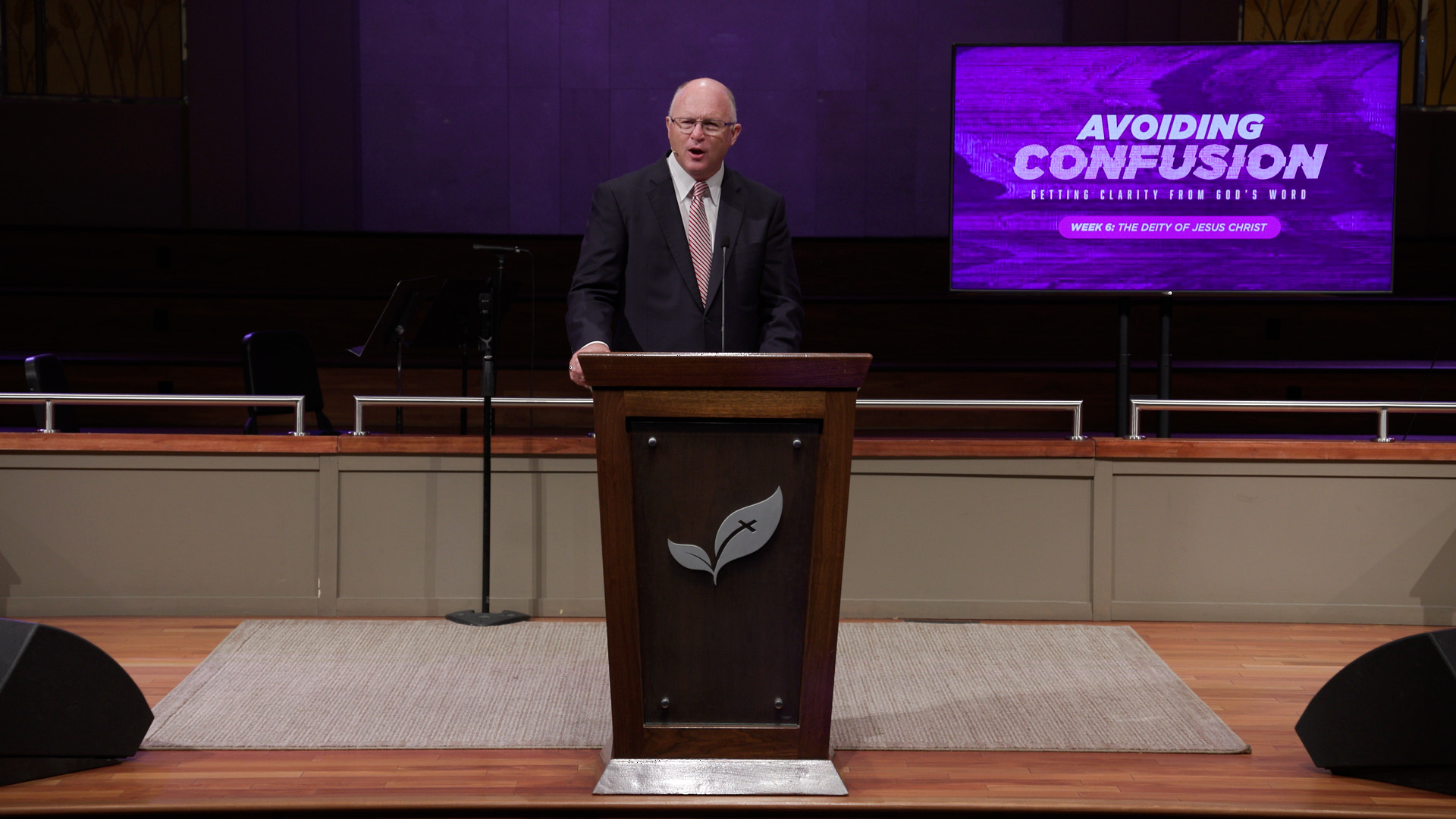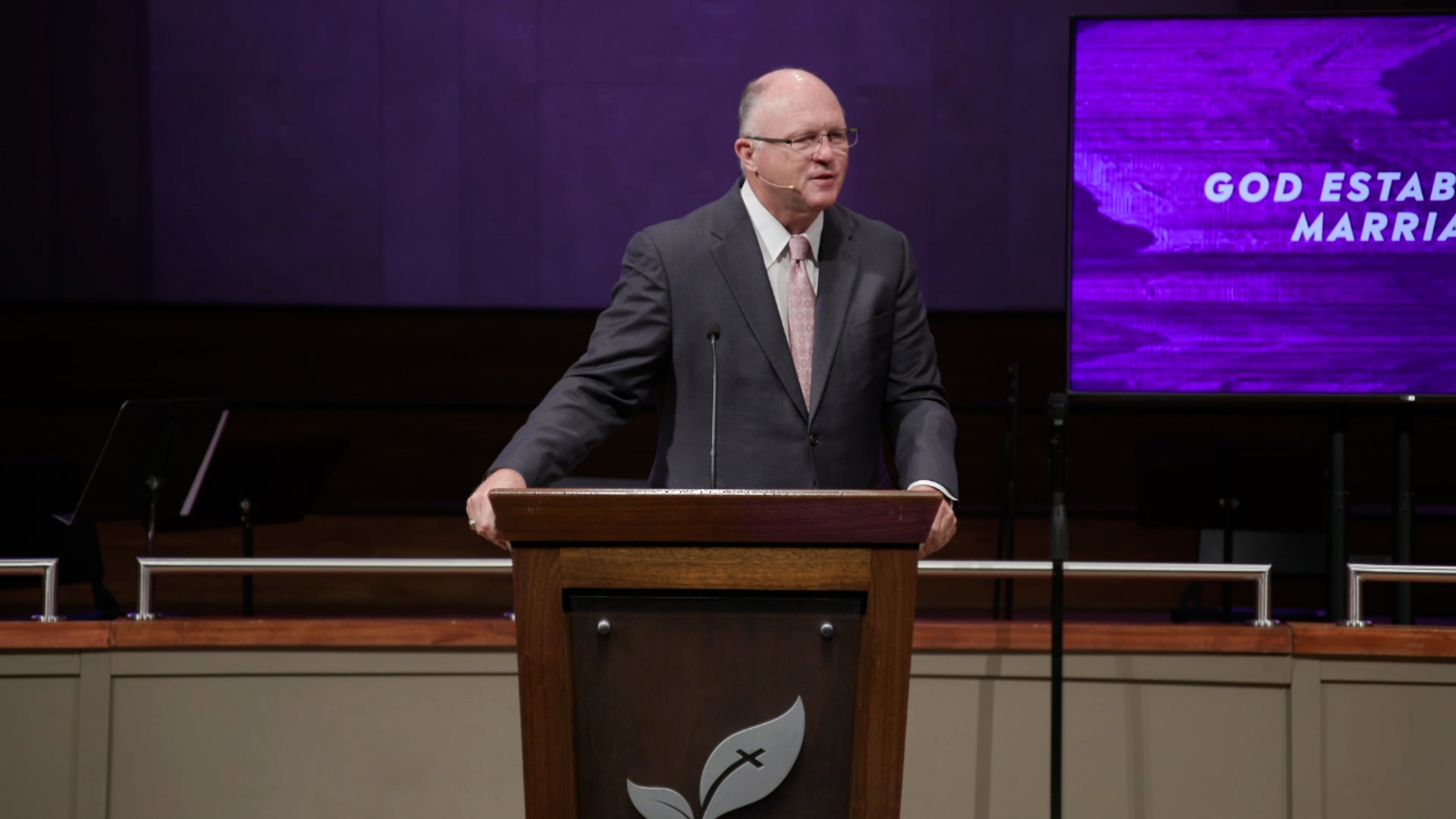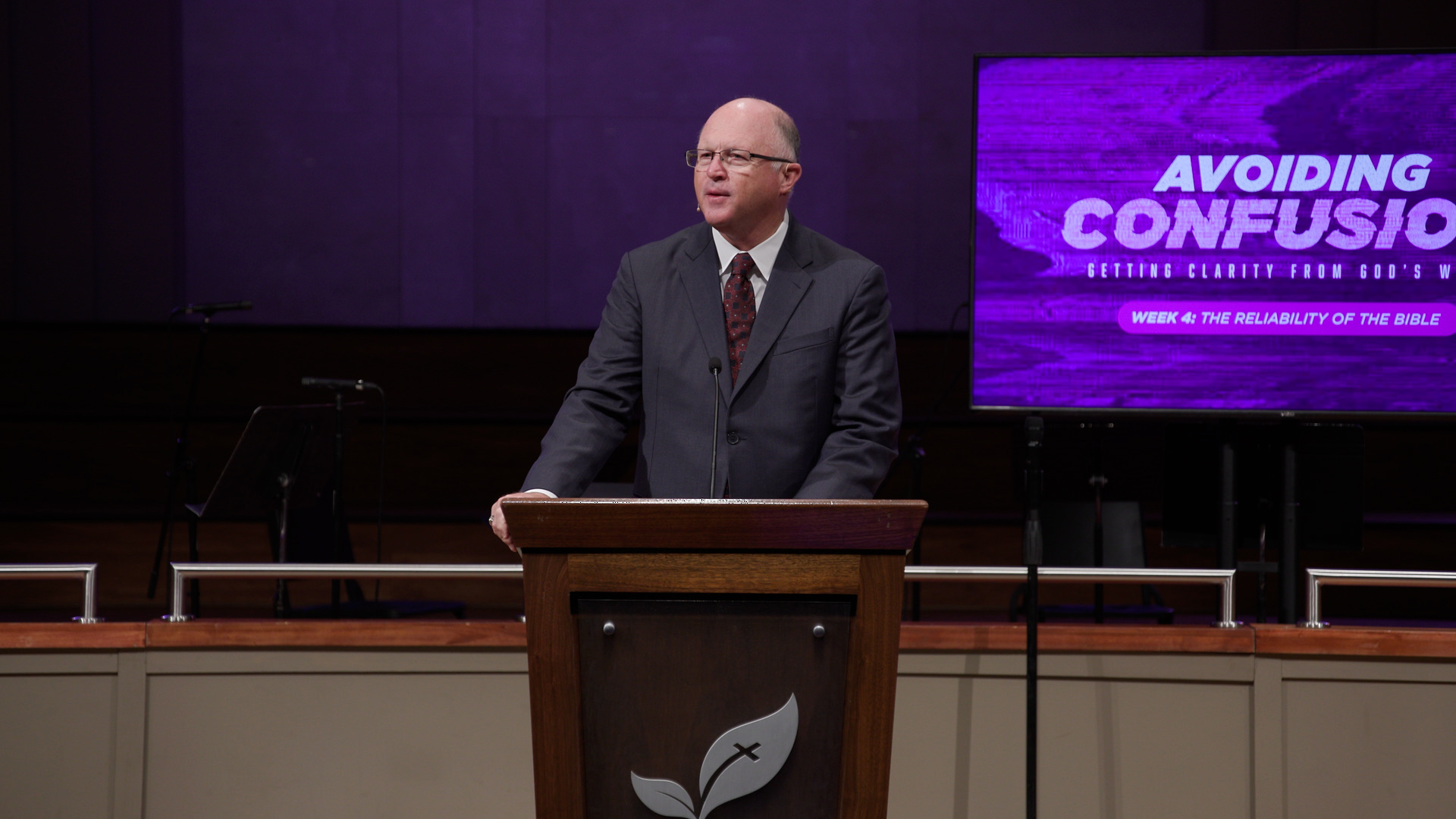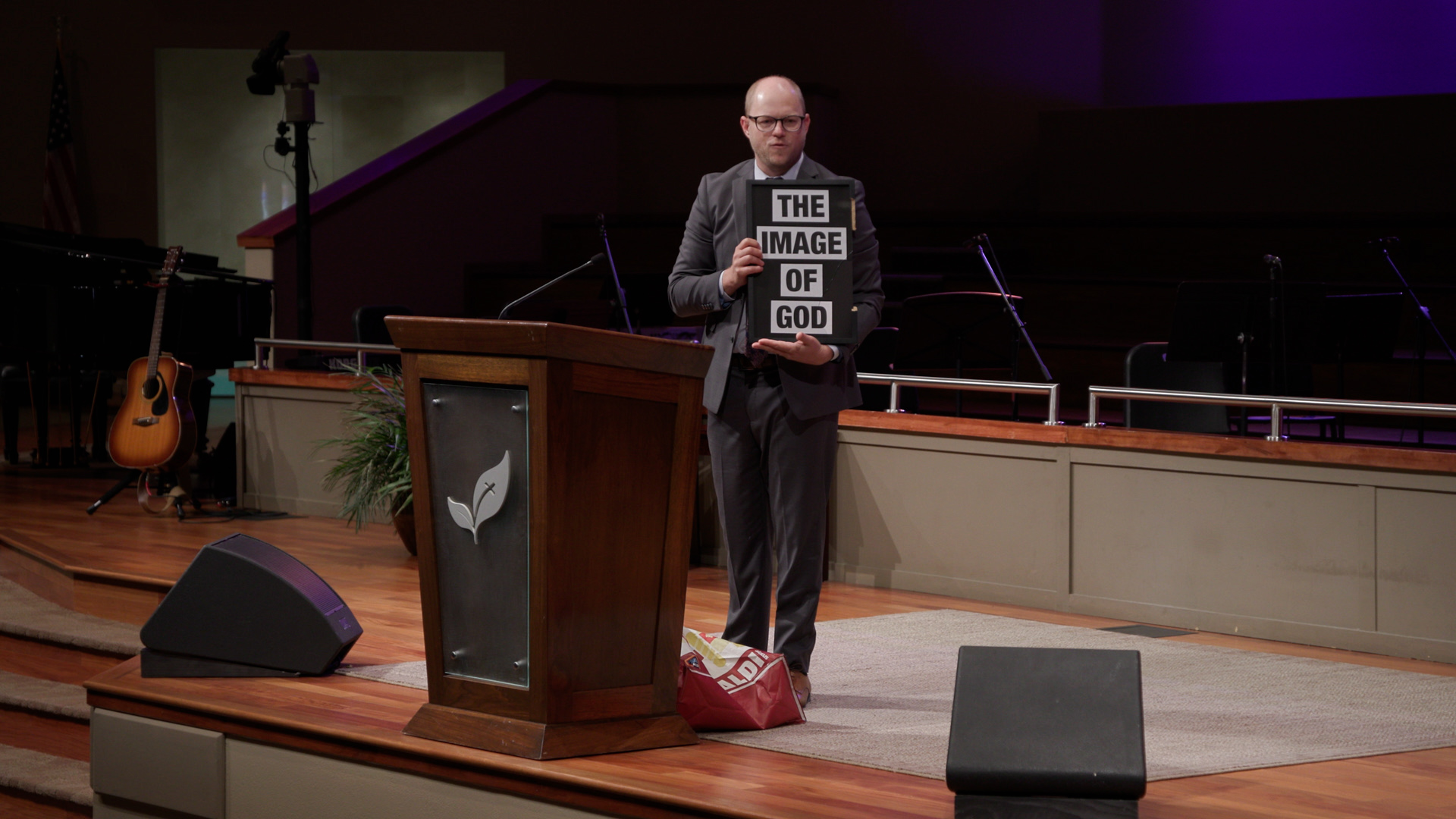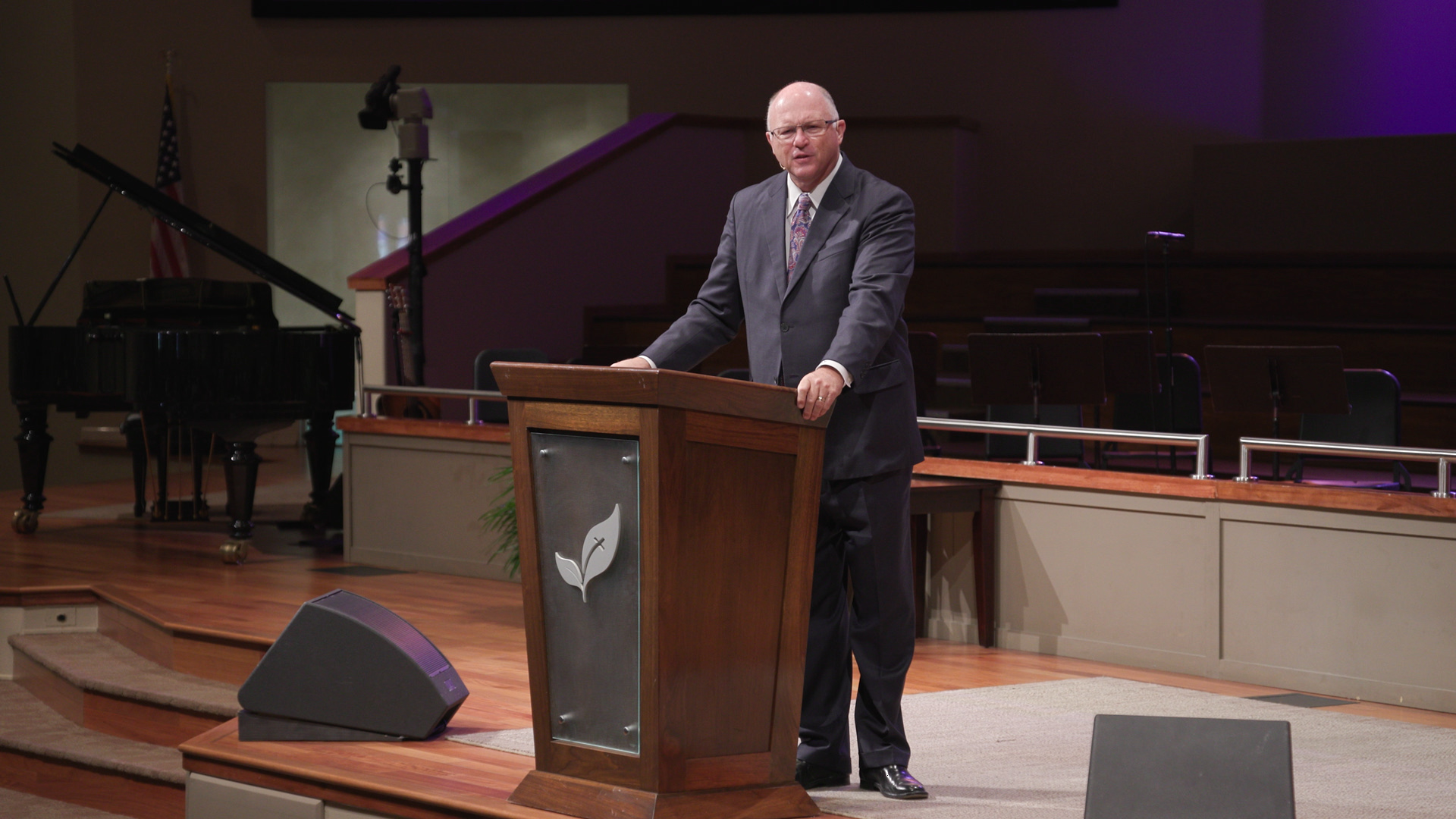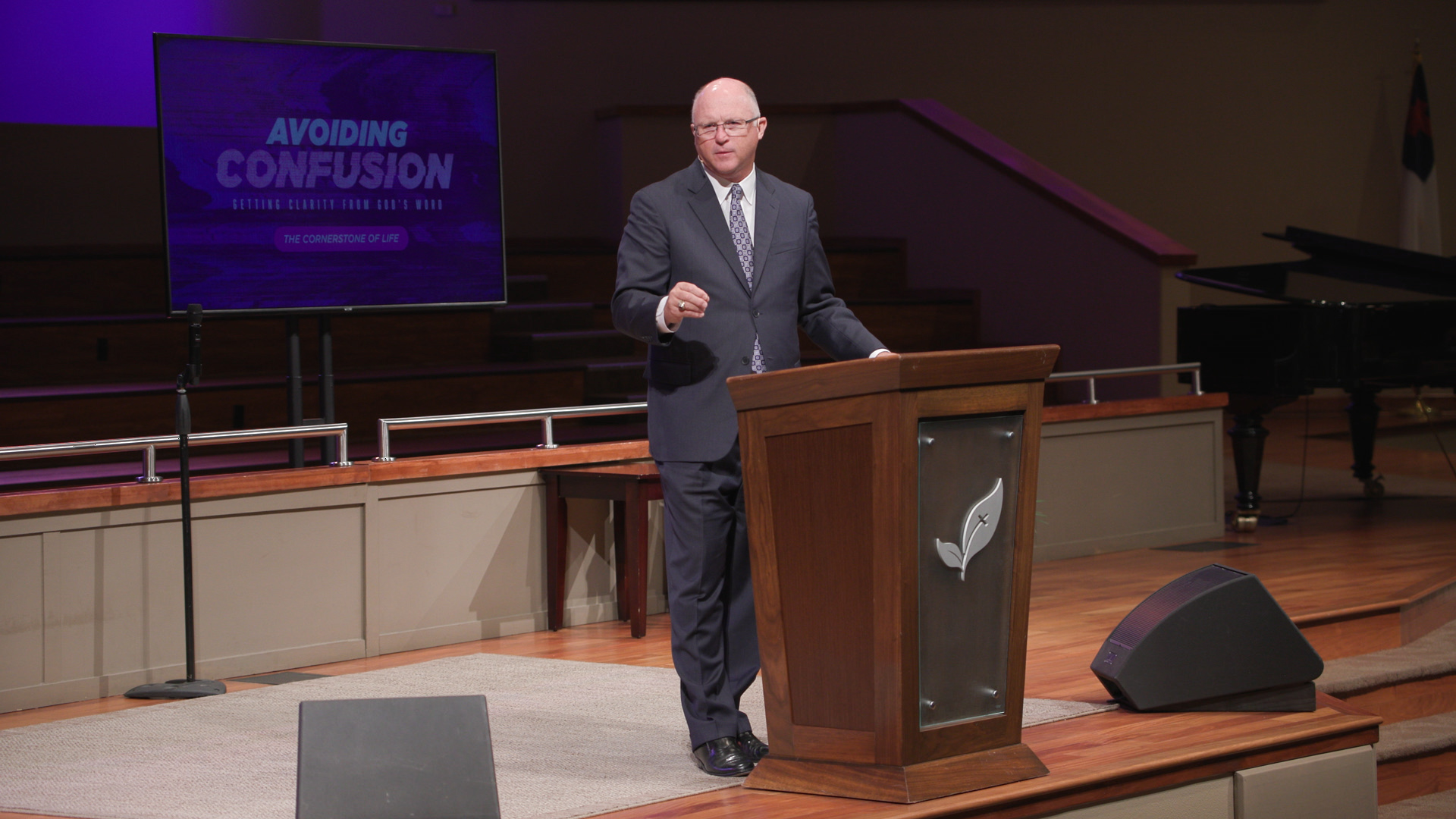Well, take your Bibles tonight and turn, if you would now, to Micah chapter 6. For those of you that have perhaps wondered, "Is tonight's message as long as this morning's?" oh, it's much longer. Of course, it's much... I don't think it will be; I think we covered a lot of the detail this morning. But I want to finish the message tonight.
First time I remember ever doing this; I might have done it once before. This morning we had Part One, and tonight we're going to have Part Two. Let's stand together, please. I'm going to read the Scripture and pray, and then we'll have one song and we'll get right into the message: Micah chapter 6.
How many of you were in here this morning? Let me see your hands. How many of you for some reason may be teaching a class? Just curious. We're nodding here. Let me see your hands, all right? Those of you that were not in here be sure to get online and get the morning message as well.
How many of you have the outline still? Let me see your hands. How many of you do not have the outline? Okay, if you don't have the outline you can get it from the ushers later or you can get it online.
Micah 6:1, "Hear ye now what the Lord saith: Arise, contend thou before the mountains, and let the hills hear thy voice. Hear ye, O mountains, the Lord's controversy, and ye strong foundations of the earth: for the Lord hath a controversy with his people, and he will plead with Israel. O my people, what have I done unto thee? And wherein have I wearied thee? Testify against me." By the way, try to blame God, you'll never win. He said, "Go ahead, tell me what I've done so bad to you."
He says, "For I brought you out of Egypt, I redeemed you out of the house of servants; I sent before Moses, Aaron, and Miriam. O my people, remember that Balak king of Moab consulted, and what Balaam the son of Beor answered from Shittim unto Gilgal; that ye may know the righteousness of the Lord."
"Wherewith shall I come before the Lord," says Micah, "and bow myself before the high God? Shall I come before him with burnt offerings, with calves of a year old? Will the Lord be pleased with thousands of rams, or with ten thousands of rivers of oil? Shall I give my firstborn for my transgression, the fruit of my body for the sin of my soul? He hath shewed thee, O man, what is good; and what doth the Lord require of thee, but to do justly, and to love mercy, and to walk humbly with thy God?"
Let's read verse 8. I know you've got the mask. Let's read it together. Ready, begin: "He hath shewed thee, O man, what is good; and what doth the Lord require of thee, but to do justly, and to love mercy, and to walk humbly with thy God?"
Father, thank you for this wonderful time tonight. Thank you for such a dear church. Thank you for the loving spirit in this church. And, God, would you help us this week to get the gospel out? Would you help our members to take their pastor's admonition, Lord. I'm just the undershepherd, Lord. I'm trying to emphasize what you emphasize. You said, "As the Father hath sent me, so send I you." And, Lord, that's what you said; and you're the chief shepherd, I'm the undershepherd. I tried to say what I think you wanted me to say tonight. Would you help the flock to reach out for souls this week? Help me to do the same. Bless the song we're about to hear, and then bless the message tonight, I pray in Jesus' name. Amen.
Well, this morning we gave Part One of a message entitled "Social Justice or Scriptural Justice." And I'm not going to preach the entire first half of that message again, but I want to do a quick moment or two of review to kind of bring us up to the passage of Micah 6:8. We learned this morning that Judah the southern kingdom had turned from God, and that in Isaiah 59 the Bible said that truth had fallen in the streets. What a sad statement about any nation. Truth had fallen in the streets.
And so Micah, as we read a moment ago, is litigating as in a courtroom, and he's calling God's people back, and he's saying, "Listen, what does the Lord have to do? Don't you remember what he's done? He brought you out of Egypt, he led you into the Promised Land." And he says, "What should your response be?"
And by the way, what should our response be? How many of you are thankful that God brought you out of the slavery of sin and that he's taking you to a home in heaven? So what should our response be? And the psalmist said, "What can I render unto the Lord for his many benefits to me?" And the answer that Micah gives in Micah chapter 6 is stated so wonderfully in verse 8: "To do justly, and to love mercy, and to walk humbly."
Now this morning as we begin speaking about scriptural justice, we gave three overarching preliminary considerations. We said, first of all, we must remember – and I'll not give all the scriptural support this evening – but we must remember that God himself is the habitation of justice. It is his essential nature. We learned, secondly, that God wants his people to exhibit justice in the way that we live, loving our neighbor as David reigned over all of Israel and executed judgment and justice.
Thirdly, we said that men are responsible individually to God, that each and every one of us according to Deuteronomy 24:6, Ezekiel 14, that God said, "I am not going to judge the children for the sins of their fathers. Every man shall be put to death for his own sin." And so biblical justice says that even when you're in a corrupt and unfair society, God will call upon you to be faithful to him as an individual.
By the way, how many of you are thankful, for example, for Daniel who would not defile himself with a portion of the king's meat? He took his stand. He didn't blame the culture. He didn't say, "I'm this way because of the culture." But he refused to bow down to the idol on the plain of Dura. So he took responsibility.
Now as we got into the study this morning of this idea of biblical justice we noticed, first of all – and in your outline you may have written – it must be defined biblically. It must be defined biblically. And we taught this morning, "What is the biblical concept of justice?" We said biblical justice is the faithful application of the law of God. And you'll find churches that are moving away from the law of God. They do not want the moral law of God. And as I've preached many times, they're sliding into a misrepresentation of grace. You'll find that they are also getting involved in this idea of social justice and they're losing focus on soul-winning and the gospel of Jesus Christ. It's a slippery slope that we see in some corners of evangelicalism as well. But the fact is that we should be concerned about biblical concepts, including the concept of the moral and faithful application of the law of God.
So the biblical concept is, first of all, a communitive justice. That is to say, "I want to be in the right relationship with God and with others." It is a distributive justice. That is to say, "I want to distribute to those who have need, to those who are broken, to those who have been the recipients of difficulty. I want to care for them." And God is very clear that there is a biblical concept of doing justly, and we defined that this morning.
And then we not only defined the concept, but we also discussed the biblical practice, some of the "how to show justice," and we talked about Psalm 82:3, "Defend the poor and the fatherless." And we talked about James 1:27, "Pure religion and undefiled before God and the Father is this: to visit the fatherless and the widows in their affliction," the Bible says. And so, "Blessed is he that considereth the poor," Psalm 41.
We talked about the bus ministry. We talked about George Müller and different illustrations, and we talked about how sometimes in the past the church has adapted to a worldly cultural idea such as slavery, when finally the church got it right and Christians began to speak out against it; and that's why we don't want to conform to the world's norms today, we want to continuously be conforming to the clear teachings of the Word of God.
And so this morning we saw the biblical concept of doing justly, we saw the biblical practice of doing justly, and then I shared with you for about 15 or 20 minutes some of the counterfeits to biblical justice, and we talked about secularized social justice, and we talked about how the secular concept of social justice sometimes comes right up against Christianity and the Judeo-Christian ethic and sometimes is forcing upon society lifestyles and sinful habits and calling this a social justice movement, when sometimes it is not that at all. In fact, it is the pushing of a sinful agenda onto our country in many, many cases.
And so we saw the secularized social justice. We saw the critical race theory that just assumes that many people are just – that they are inherently racist. And we said that no one can truly know another man's heart. It would be wrong for any of us to say of anybody else in this room what their sins are. How many of you are like me? Listen, I've got enough trouble taking care of my own life without trying to figure out what's in your heart.
And so we talked about secular social justice, critical race theory, and then we talked about what I mentioned a moment ago: the liberal religious interpretation of social justice, these churches that are actually taking the vernacular, the verbiage of the social justice movement. They're bringing it into their worship, and some are going to the extreme of saying, "If you want to get to heaven you've got to work for the social justice," and they're adding to salvation. And we said the doctrine of salvation is sacred, we must guard it. And Galatians said that we must – "If an angel from heaven preaches another gospel we should reject that gospel." T
here is one gospel: it is the death, burial, and resurrection of Jesus Christ, and no works is going to get you to heaven. And so this idea that is coming into the church that if we as a church advocate for LBGQ or for this or for that, then somehow we're going to get merit with God. In fact, we might get the condemnation of God rather than the blessing of God.
And so this morning we spent considerable time on Point Number One: "What is legitimately biblical justice and doing justly all about?" And we defined it biblically, and we said whenever you hear the word "social justice" put it in the light of Scripture to make sure that you're not putting your hashtag to something that you find out later is really unscriptural and anti-American. And that's what we did this morning. We really this morning tried to define biblically what it means to do justly.
So justice must be defined biblically. Now you can take it further than I've taken it. I'm going to share with you my 40 pages of notes today. You can get in the Scriptures and go to a Strong's concordance and you can study the word "justice," and I believe you'll find that we have interpreted accurately what biblical justice is in the morning message. But I want to bring you to Point Two tonight because justice must not only be defined biblically, but it, secondly, must be deployed mercifully. It must be deployed mercifully.
Now herein is one of the challenges that conservative Bible-believing churches face. We know how to define the terms, but we're not always good at mercifully deploying God's love. Many churches that are fundamental, they know how to dot the I and cross the T in their fundamental doctrine, and yet they are not given to mercifully showing the world the love of God. So look at what it says in verse 8. He says, "This is what I require of thee, to do justly, and to love mercy." So let's discuss this matter of deploying mercifully, because love is the action of expressing God's love to this world.
Now if justice is not about condoning the LGBTQ movement, if biblical justice is not a victimization mentality or the redistribution of other people's wealth, then how do we as Christians show mercy in the context of ministry today? As God shows us mercy, we in turn must be the conduits of his mercy to help others in their time of need including – listen – most importantly their need for the Savior.
Now how many of you are thankful, as one songwriter put it, that God reached way down for you? Right? How many of you are thankful that God was merciful to you? And God says, "I want you to show that same mercy to others."
Now I heard about a young lady who occasionally walked through a park after work, and one day she stopped and she had her picture taken, and the photographer snapped a picture and she was kind of excited about having that picture and receiving the Polaroid of it. And so as she walked out of the park she took that Polaroid picture and she looked at it with some shock and with some amazement, and she turned back to the cameraman, and when she got there she said, "This is not right. This is not right. You have done me no justice." And the photographer looked at the picture and he looked at her and he said, "Miss, you don't need justice, you need mercy."
So sometimes after we understand what justice is, we don't want to just be the Pharisee in the corner who can define justice. By the way, isn't God such a lovingly balanced God? A false balance is an abomination. You can know what justice is, but if you're not showing mercy to people in their time of need, you're no better than the Pharisees of the New Testament. So he says, "I want you to know and do justice, but I want you to show love and mercy in the world around you.
Now let me speak to you about this matter of deploying justice mercifully. First of all, I believe God is calling us as a people to stand with mercy. The Bible says in Ephesians chapter 4, "Speak the truth in love." God wants us to stand for justice. He wants us to know his moral law, and he wants us to stand by the principles of his word, but we must do this with love and with mercy. The justice of God is used to relieve the poor, to visit the oppressed, to care for the orphan.
I remember visiting a church in the Philippines, and that particular trip years ago we had our children with us – I think Matthew might have been six or seven maybe, I can't remember – and we visited an orphanage. And as we visited the orphanage that was operated by one of the missionaries there, it was amazing. It's just absolutely amazing. The missionary said, "Can I tell you how we receive the children in the orphanage?" And I thought there must be some big legal process. He said, "I'll tell you how." He said, "Poor people come to our church, put the baby in the nursery, leave and never come back." He said, "That's how we started the orphanage."
And he said that, and Matthew heard that; and frankly, it really kind of gets on you. And Matthew began to say, "Dad, I want a brother. I want one of those boys for my brother." And I don't want to sound cruel or as though I understand justice and have no mercy, but I wasn't feeling the same leading at the moment. I was leading a conference, I was busy. Sometimes we've thought maybe we should have adopted. And I think it's a wonderful thing. I think many of you that perhaps the Lord might lay it on your heart. But the Lord wasn't laying it on my heart, but he was laying it on Matthew's heart, and he just continued, "Dad, I want a brother. Dad, those boys, they don't have a home. I want a brother."
And I remember we were having a meal. There were several speakers. Brother Gibbs was there. Matthew got up from his seat and went over to Brother Gibbs. He said, "I'm going tell you a secret," to Brother Gibbs like this. After while Brother Gibbs said – he said, "Matthew wants a brother." And Matthew found an advocate, he found a very good advocate.
You see, God wants his church to stand for justice and to strive for equity, but he wants us to show mercy. Now I could give you a long list of things that I believe the church should be sensitive towards, I'll mention a few. I think about families that are torn apart by alcohol tonight. I think about how the knock-knock-knock of a Sunday school teacher or a bus worker. It's the hope of a child. It's someone that truly cares. I think about the fact that these children many times see consistency from a Christian witness. Some of them have been abused. Some of them have been sexually abused.
I believe the church should care for people who've been treated as though they don't matter, who have just been abused. I think about many that we've had, many that have come to our church over the years, many women, young women, who have been sexually abused, and they come and they have counsel from a lady in the church, and they get into a class or they get into counseling, and they felt like they were worthless in this world, and they begin to find that when you're saved, your worth is based on your new birth, and that we are accepted in the Beloved, and that we are a great treasure to Jesus; and they begin to find new hope. And I want to say that sometimes the reason that there is such anger and hostility towards religion is because religion has not always handled this as they should. There has not always been mercy for the victim.
Now we do not advocate the Roman Catholic doctrines, the doctrines of Rome – I won't take the time to go into that – but I think about the country of Ireland tonight where the priests molested hundreds and hundreds of people, and the entire country is turned away from God, not attending any church: Catholic, Protestant, Baptist – the numbers are down. The Prime Minister is a wicked ungodly man, and entire nation is cold, and the social justice movement is rampant in Ireland. Why? Because, in large part, of religious people.
Over the years we've seen Baptist churches that did not handle these issues right, and they were so concerned with keeping their image that they just kind of disregarded the victim in the process. And what does it do? It hurts the testimony of Christ and it creates an anger, and people want revenge, and they feel victimized, and so they begin a new campaign for social justice. And that's why as a church we must always confront sin and deal with sin and help the victim of sin and be sensitive to the Holy Spirit throughout the entire process.
I tell you, one of the greatest challenges for me as a pastor is sometimes you'll talk to a member, and especially over the years, this past year a lot of online stuff and people looking here and there, and I get that. And sometimes you'll hear from a member, a former member, and they'll talk about some preacher that they've seen out there maybe on livestream or something, and they'll maybe kind of smugly say, "Oh man, he's really preaching it. Boy, I'll tell you what, he's really conservative, I'll tell you what."
And being a pastor, I know pastors like some of you know airplane parts. And sometimes the insinuation, "Boy, they're really holding the line, boy, because they scream. And, man, they sing my favorite hymn," and they've had numerous times when there was sexual sin that never was dealt with and the victims set aside. Sometimes people say, "Well, I'm going to be going over here or there or whatever." I'll just smile and say, "God bless you."
Just let me say tonight that as a church, whenever someone, whether it's in the church or outside of the church, experiences the injustice, the predatory behavior of someone that should have helped them, that we should be more concerned for the victim than for covering up for the one that did the sin. Somebody could say amen right now. Show mercy! Mercy on the woman in the corner with tears, mercy on the child whose parents have left, child exploitation.
When this movie came out with Netflix, when they were showing – and it's currently showing on Netflix – this movie that's showing 11 and 12-year-old girls in provocative situations, I thank God that Senator Cruz and others are calling them in before a senate committee for their demeaning of these young children, for their exploitation. They're bringing Netflix in for a moment of justice. Listen, that's why it does matter who we support from time to time.
And when there is a form of racism – and I know that word is thrown. And sometimes, as we said earlier this morning, it's just in an incendiary guilt trip. But when it legitimately is happening, and it's in your heart, or you've seen it, you've seen a child say a word that's demeaning to another child, there's nothing wrong with getting right in the middle of that, and with love and mercy saying, "Boys, let's talk. We don't say that word. We're not going to use that terminology. We're going to do justice, and we're going to show mercy on the playground and on the football field. We're going to be real Christians out here." It's okay to say those things, to say those admonitions against those words that are said.
I think of hunger. I think of the Thanksgiving season. And I know some people take advantage. We have people call us every day. And, look, if you're going to be in the ministry you're going to have – sometimes be taken advantage of; I understand that. But I don't want to be indifferent to someone that may have real need.
I remember years ago I received a letter from a young man in India named Ning. And Brother Frusso, what's the other young man's name? Shout it out to me. Yeah, Shimri. Ning and Shimri. Now I don't have time to tell you how many letters I get from Nigeria and India and all over the world every day asking for money. And it's usually very well-written letter: "My dear Dr. Chappell, brother, pastor in the faith. Greetings," you know, and just on, and pretty soon – and it's amazing what they ask for, like $74 million and stuff like that. It's just – you'd have to read some of them, they're amazing.
So here comes a letter from Ning and Shimri. And Ning and Shimri were asking admittance to West Coast Baptist College, and they were asking for assistance to come. And they gave their explanation of why and kind of their letter in broken English why. And I forget if it was Dr. Rasmussen or who it was, and they presented it, and I said, "Boy, we've never taken a foreign student like that, I don't about it, I don't know if we should, and I don't know if we can afford to help," and I just said, "I don't think we can. I don't think we can." And so, that was that.
That night, I went to bed. And I wish this wasn't true, but a lot of times I just wake up at night just thinking about stuff; and then I go to prayer, read the Bible, and then come back to bed. And that was one of those nights. I woke up, and I don't know why: I was thinking about Shimri and Brother Ning. I did not have the Lord speak to me in an audible voice, okay, let's understand that. But the Lord said to me, "Let Ning and Shimri come into your college, and do whatever you have to do to help them."
And I just went to the staff meeting the next day. I said, "Brother Rasmussen, let's let Ning and Shimri come." Some of you might remember those young men. Folks, you should read their prayer letters. They graduated four years from West Coast Baptist College. They went to Northern India. They have started dozens of churches and a Bible college and an orphanage. They are seeing thousands of people saved. They may be the two most prestigious graduates ever to come from West Coast Baptist College because we showed mercy! When God tells you to show mercy, don't quench his Spirit.
I got a call this week from a pastor in Texas. He said, "Brother Chappell, I don't know why the Lord just put you on my mind." He said, "I don't have a large church." I think he said they run about 70 or 80. He said, "But there was – I just made a prayer request for Lancaster Baptist Church, and I just said, 'Let's pray for Brother Chappell.'" He said, "I just want you to know, a lady came up to me after church. She gave me a check. She said, 'Pastor, send this to Brother Chappell for the church in Lancaster.'" This was a woman that God said, "Show some mercy." I said, "Oh, brother, that's not necessary." He said, "No, God put it on her heart!" When God puts something on your heart, don't say no to God.
Romans 12:9, "Let your love be without dissimulation. Abhor that which is evil; cleave to that which is good." Abhorring evil is justice. Verse 10: "Be kindly affectioned one to another; in honor preferring one another," you see. We must stand with mercy. Let her be. We must stand with the gospel.
Folks, please get this tonight. If we're going to show mercy we must show it with the gospel. A biblical Christian lifts up Christ and the gospel because Jesus is the equalizer of all men. Every one of us in here are brothers and sisters. To prefer one another and love one another is our privilege because we are all the children of God through Christ. Ephesians 2:4, "But God, who is rich in mercy, for his great love wherewith he loved us, even when we were dead in sins, hath quickened us together with Christ."
You see, looky here: justice and mercy must always go together. Yes, we stand for the moral standard of God. No, we will not accept many of the social justice movements and the various anti-God rhetoric that comes forth from them, and the burning of the flag, or whatever it might be. But while we stand for true biblical justice, we must stand for true biblical mercy, and we must stand with the gospel, the message of the gospel, which I preached this morning.
The fact that all of us are in sin, the fact that God who is just could not let me into heaven the way I was, and so he sent his Son Jesus Christ to shed his blood upon the cross; now then, when I accept Christ as my Savior, God can admit me to heaven. God allows me a standing of justification and sanctification, not on my merit, but because of what Jesus did, God is just in letting me as a sinner off through the blood of Jesus Christ.
I can hear my granddad saying that to me right now. He would drive down the old country roads in that Ford truck, and I'd sit next to him, and he'd start preaching Romans chapter 5, and he'd say, "A righteous God can't let a sinner off unless there's a price that is paid. He can't be a just God and let someone who's a sinner into heaven." But Paul – the Bible says that, "God commendeth his love toward us, in that, while we were yet sinners, Christ died for us." And my granddad would, hmm, slap me on the leg and say, "Isn't that good?" And I ask you tonight, "Isn't that good that God, our just God is also a merciful God?"
Do you want to know what justice is? Do you want to know what I deserve? I don't deserve a home in heaven. If I got what I deserved, I would have a home in hell. "The wages of sin is death." You want to talk about justice, that's what I deserve. "But God, who is rich in mercy, sent his only Son." Oh, what a Savior, what a Savior. He demonstrated his justice by meeting my need. "For God so loved the world, that he gave his only begotten Son." Thank you, Lord.
So that's the message of the gospel. How many of you are thankful for the message of the gospel? But I want you to see here the mercy of the gospel. What was the mercy in the gospel? It was Romans 5:8, "But God commendeth his love toward us, in that, while we were yet sinners," – what happened? – "Christ died for us." The greatest act of mercy the world has ever seen. And Micah says, "Love mercy." And Jesus showed mercy.
Now I want to speak to you as believers tonight. I want you to kind of put your thinking caps on and hear me tonight, and I want you to understand – and I would not preach this particularly to a new Christian, to the unsaved, but I want you to hear me now. If we are not winning souls, we are not practicing justice. If we are not reaching out with the gospel in mercy, we are not doing justice to a lost and dying world. If you had the cure for cancer and it was in your cabinet and you never took it out and you never took it to the hospital, that would be an injustice!
We have the cure for sin! We have the hope of heaven! And if we as a church do not take it out to this lost and dying world, we are not doing justly! Please, if you're a Christian, don't tweet about social justice. Don't hashtag about social justice. If you are not trying to share the mercy of Jesus Christ with the lost – and I want to say this lovingly, but sincerely tonight – if someone is talking about social justice, social justice, and they are a Christian and they are not endeavoring to talk about Jesus, Jesus, Jesus, and they're not sharing the gospel, they are of all men most hypocritical! You do not believe in any kind of justice if you have the covering for sin in the gospel and you never tell somebody how unjust can we be.
And we have young Christians, and they're running around and they're on the social media, and I know their hearts are heavy, and they've seen some injustice. And I'm not here to say what is and what isn't; everyone can deal with that. Let me just say this tonight. If you as a Christian or a Christian young person are talking about all those things and, "It's a free country, go ahead," but you're not telling people how to have their sin forgiven and how to go to heaven, you're missing the main issue of justice. The greatest participation in justice in doing justly is telling someone else how to get saved. Amen!
God deliver us from repeating the antics of the world and hashtag this and got you there and ha-ha you, and going on on all these little rampages. Listen, my number one priority and yours is, yes, to do justly, but to show mercy. And the best way to show mercy to Lancaster is to tell them that there's a God in heaven who loves them and doesn't want them to go to hell.
Turn in your Bible to Matthew 16, Matthew 16:26. Justice is defined biblically, but it must be deployed mercifully. Matthew 16:26, "For what is a man profited, if he shall gain the whole world, and lose his" – what? – "own soul?" Okay. Come on now. Let's just say that one day – come on, help me – you meet the most victimized person in the whole world, and he says, "I've been discriminated in such ways. I've been mistreated by the police." By the way, that happens sometimes. One of our dear members told me about an experience he had in getting arrested and thrown around, and it was the wrong guy; it happens.
So let's say we take that guy and we bring him to the sheriff and he gets an apology, and they give him $100,000.00 and they give him a badge and make him a lifetime member. And then he says, "But that's not all." He says, "When I was in the second grade, my teacher called me a name in front of the whole class; I just can't get over it." So we go find that teacher, and the teacher apologizes and puts it out on Facebook, and he gets $100,000.00 from the school district.
And so, he says, "But that's not all." He said, "I was passed over for my job, and I should have had the promotion," and so we go over to Lockheed and we say, "Look, that wasn't just, that wasn't right," and the president of Lockheed gives an apology, gives him $100,000.00, gives him a promotion. And he says, "But that's not all." He said, "You won't believe it, but my ex-wife, she did so-and-so and it wasn't right and she left me. And you say, "Boy, I'm sorry about that," and we help him. Maybe we even help him to get remarried and reconciled, and she gives him $100,000.00. And we help him through four dire situations, and he's got a half a million dollars, and we never tell him about Jesus, and we failed!
Go ahead and march! Go ahead and burn the flag! Go ahead and curse! Go ahead and get mad on the Internet! Go ahead and right all the wrongs in the whole world! But if you don't win someone to Jesus, we didn't take care of their greatest need, my friend. And the church is running from cause to cause, and Christian young people from this to that, and they're trying to get their parents into it, and they're putting guilt on everybody. If you're any kind of a human, hashtag this! If you're any kind of a Christian, preach this! It's time for the church to be the church, and our message of reconciliation is the gospel of Jesus Christ. That's mercy.
You heard of the man who stood up at a missions conference, and he was speaking about the Iranian hostage conflict several years ago. And some of you recall they were trying to get them home. And he said to the congregation, "How many of you have been praying?" I forget the number – several dozen hostages. "How many of you have been praying for the hostages in Iran?" And boy, everybody raised their hands, because they want justice for those hostages. They want them to be brought home.
And then he said, "How many of you have been praying for the 60 million hostages to Islam who live in Iran?" Not one hand was raised. Folks, it's one thing to seek some form of justice in society, in the city, in the state, in the country, in the world. Sometimes there's a place for that. But the main response and responsibility of the church is to take the gospel to this world. That's our job. Jesus said, "As the Father has sent me, so send I you."
So justice is defined biblically, but it must be deployed mercifully. And if we're not sharing the gospel, we're missing the whole point, we're missing the whole point. This is not a social gospel church, this is a soul-winning church. We want to show love in mercy, but every act of mercy here will be accompanied with the message of Jesus Christ.
Finally, God says, "I want this justice displayed humbly, displayed humbly." Notice this in verse 8 again: "What does the Lord require of thee, but to do justly, and to love mercy, and to walk humbly with thy God?"
Now earlier, Micah had asked these questions: "What does require, thousands of rivers of oil and thousands of sacrifices? What does he require?" The prophet is not rejecting those rituals, he simply reasserts – listen, listen – that the moral law has greater emphasis here than the ceremonial law. He's saying, "All the ceremony that you might do is fine, but what God wants is obedience from the heart," right? And just like the Old Testament saints, we know how to do things outwardly, but God sees the heart. And so that's why he says finally here, "to walk humbly with thy God, to walk humbly with thy God." There must be humility before God.
James 4:6, would you turn there, please? James 4:6. It says, "But he giveth more grace. Wherefore he saith, 'God resisteth the proud, but giveth grace unto the humble.'" God says, "I'm looking for someone" – watch this now – "who's not going around demanding their rights, but someone who's going around looking to serve."
If there's ever a march in Lancaster and people are demanding something, and you hear that Pastor was there, you can mark this down: I will be there passing out tracts. I will be there preaching. God's going to take care of all the wrongs and the rights and the demands, but God says, "I don't want you thumping your chest in that way, I want you to walk humbly." "He resisteth the proud and giveth grace to the humble."
There was a very strong sermon preached, and there was a man that came to the altar and he was crying out, "Lord, I'm nothing! Lord, I'm nothing!" A second man came next to him; he began to cry out, "Lord, I'm nothing! Lord, I'm nothing!" He was so overwhelmed, he kept saying it: "Lord, I'm nothing!" Finally the first man looked at the second man and said, "Well look who thinks he's nothing." Pride. Pride. God says, "I want you to do justly, I want you to show mercy, and I want you to walk humbly – humbly before God, and then humbly before others."
One more passage and then we'll be done. Philippians 2:1, please. Philippians 2:1. "If there be therefore any consolation in Christ, if any comfort of love, if any fellowship of the Spirit, if any bowels and mercies, fulfil ye my joy, that ye be likeminded, having the same love, being of one accord, of one mind. Let nothing be done through strife or vainglory; but in lowliness of mind let each esteem other better than themselves. Look not every man on his own things, but every man also on the things of others."
Now sometimes if we're not careful it's easy to see the pride maybe in the social justice movement. It's not real hard to figure out there's anger when things are being burned and torn down. But may I say that while it's easy to see pride in other people's lives, sometimes we don't see it in our own lives.
I remember years ago, of all things, I was out soul-winning with a gentleman, and as we were out soul-winning, we – afterwards, they had just opened In-N-Out Burger, and we felt led of the Lord – or the flesh, I cannot tell – to go to In-N-Out Burger. So we went in there, and I ordered a double-double animal style, two French fries, and a strawberry shake – just saying. We were on hallelujah ground. And while we were there, a group of not just any gang, but a group of Hells Angels came in to the parking lot.
Man, if you've ever, "Wha-ma-ma-ma-ma-ma-ma-ma-ma-ma-ma," you know what I'm talking about. I don't know, there were a dozen or more, and they're, "Wha-ma-ma," coming in there. And my soul-winning partner who was good at doing justly and knowing right and wrong, said to me, quote: "Sometimes when I see people like that I just pray that God would just take 'em straight down to hell." I'll never forget that.
That would be the opposite of mercy. It put goosebumps on me. I said, "Ah, you don't mean that," and he kind of said, "Yeah, I know." I guess he thought it sounded real righteous to say that. I went over and gave every one of those men a tract, and I told 12 Hells Angels, "Hey, here's something to show you how you can go to heaven someday when you die. By the way, God can save a Hells Angel."
Now let's talk about serving humbly. There may be somebody that you know and they're all into this hardcore social justice argumentation, they're flamingly involved in some lifestyle the Bible speaks against. You will never bring them to Christ with pride and anger. That's not how it's going to happen.
Dr. R. and I have common neighbors, we have a lot of different neighbors in our neighborhood. One of them is a gay couple. What does Dr. R. do? Because he's a man of the law, you know, he's a college vice president and they have to know rules that aren't even in the Bible. "So how do you treat your neighbor?" Mrs. Rasmussen said about once a month cooks them a cake, tries to share Christ with them.
I had a man in my home Thursday. I just began talking to him. He came with another friend. I didn't know he was coming, but his friend brought him. I asked what he did, and he told me. Tall fellow, deep voice, in the media industry, a gay man. You say, "Ah, I bet Pastor gave him a bucketload of his mind about it." No. I gave him some of my wife's food. I gave him the gospel. Said, "You had one of those reprobates in your home?" But for the grace of God there go I and there go you! God says, "I want you, church, to show mercy and to walk humbly.
We have our convictions at this church. We're not going to be having those gentlemen to teach in the Sunday school. Though the laws may try to change it, though there may come a challenge along the way, we're going to stand by our biblical convictions, we're going to do justly, but we're going to do it with mercy and love, mercy and love.
The distinction with God's servants – look – you don't see Baptists people burning stuff up. There's a difference between the social justice movement and biblical justice; and listen, the difference is mercy and love. You say, "But you preach hard and hit the pulpit!" Yes, I do, because God is a just God. But God who is a just God is a merciful God. And we must remember tonight what is required of us. What did God require through Micah? To do justly, to love mercy, and to walk humbly.
Some of you are pretty good at knowing the laws, and why you're against this and for that. But how are you tonight at showing mercy? How about your heart? Is there a humility there? Is there someone that you know that maybe they have a completely different set of values but they need Christ? Could you show them the gospel? Could you show them mercy and let them know that Jesus died for them? I don't want to be that church that has the missionaries in because they go out and witness, I want to be that witnessing church with the missionary mindset, so that the missionaries get encouraged by being around here, because what is required of thee? To do justly, to love mercy, and to walk humbly before the Lord.
[End of Audio]

